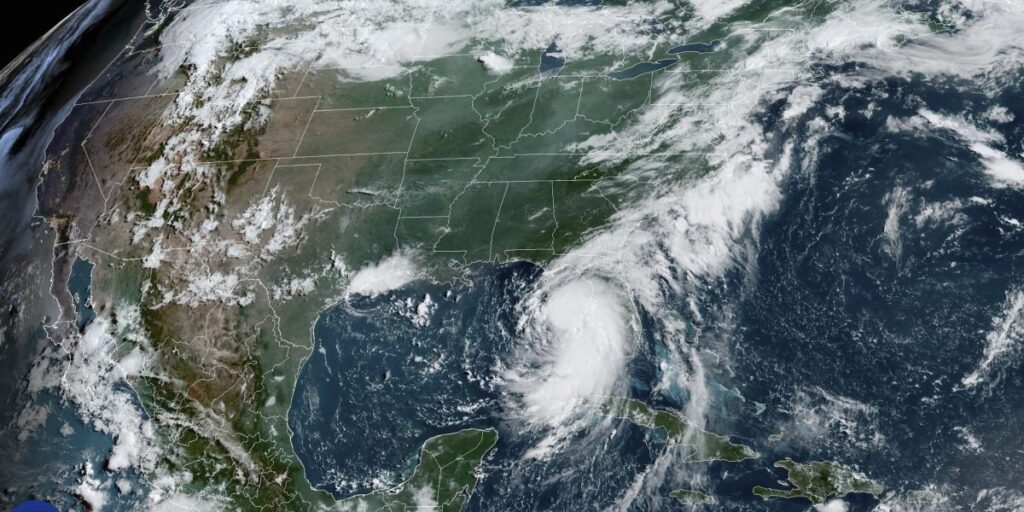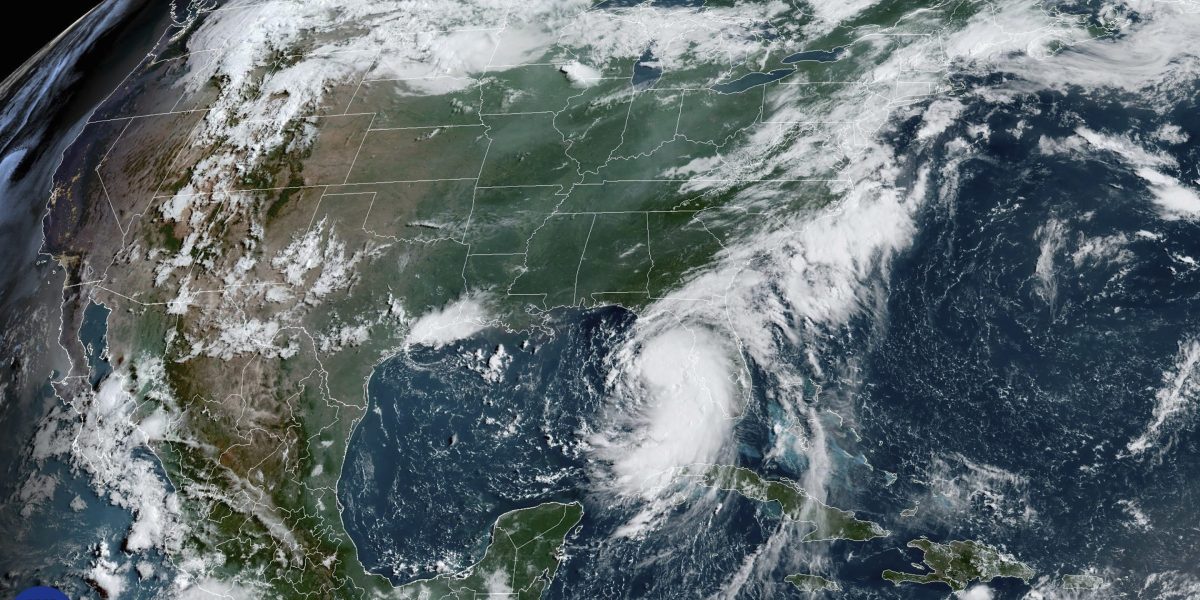Tropical Storm Debby is expected to hit Florida as a hurricane and dump record rain farther north
The storm was likely to become a strong Category 1 hurricane before making landfall Monday in the Big Bend region of Florida, the National Hurricane Center in Miami said.


Tropical Storm Debby was strengthening rapidly Sunday and was expected to become a hurricane as it churned through the Gulf of Mexico toward Florida, bringing with it the threat of devastating floods to the southeast Atlantic coast later in the week.
The storm was likely to become a strong Category 1 hurricane before making landfall Monday in the Big Bend region of Florida, the National Hurricane Center in Miami said.
From there, Debby was expected to move eastward over northern Florida and then stall over the coastal regions of Georgia and South Carolina, thrashing the region with potential record-setting rains totaling up to 30 inches (76 centimeters) beginning Tuesday. Officials also warned of life-threatening storm surge along Florida’s Gulf Coast, with 6 to 10 feet of inundation expected Monday between the Ochlockonee and Suwannee rivers.
“There’s some really amazing rainfall totals being forecast and amazing in a bad way,” Michael Brennan, director of the hurricane center, said at a briefing. “That would be record-breaking rainfall associated with a tropical cyclone for both the states of Georgia and South Carolina if we got up to the 30 inch level.”
Flooding impacts could last through Friday and are expected to be especially severe in low-lying areas near the coast, including Savannah, Georgia; Hilton Head, South Carolina; and Charleston, South Carolina.
Officials in Savannah said the area could see a month’s worth of rain in four days if the system stalls over the region.
“This is going to a significant storm. The word historic cannot be underscored here,” Savannah Mayor Van. R. Johnson said during a press conference.
The hurricane center said in a 2 p.m. update that Debby was located about 125 miles (205 kilometers) west-southwest of Tampa, Florida, with maximum sustained winds of 65 mph (105 kph). The storm was moving north-northwest at 13 mph (21 kph).
Debby’s outer bands grazed the west coast of Florida, flooding streets and bringing power outages. Sarasota County officials said most roadways on Siesta Key, a barrier island off the coast of Sarasota, were under water. The hurricane center predicted the system would strengthen as it curved off the southwest Florida coast, where the water has been extremely warm.
At a briefing Sunday afternoon, Florida Gov. Ron DeSantis warned that the storm could lead to “really, really significant flooding that will happen in North Central Florida.”
He said it would follow a similar track to Hurricane Idalia, which lashed the state last year, but would “be much wetter. We are going to see much more inundation.”
Debby is the fourth named storm of the 2024 Atlantic hurricane season after Tropical Storm Alberto, Hurricane Beryl and Tropical Storm Chris, all of which formed in June.
A hurricane warning was issued for parts of the Big Bend and the Florida Panhandle, while tropical storm warnings were posted for Florida’s West Coast, the southern Florida Keys and Dry Tortugas. A tropical storm watch extended farther west into the Panhandle.
Tropical storms and hurricanes can trigger river flooding and overwhelm drainage systems and canals. Forecasters warned of 6 to 12 inches (15 centimeters to 30 centimeters) of rain and up to 18 inches (46 centimeters) in isolated areas of Florida.
Storm surge expected to hit Gulf Coast, including Tampa Bay
Flat Florida is prone to flooding even on sunny days, and the storm was predicted to bring a surge of 2 to 4 feet (0.6 to 1.2 meters) along most of the Gulf Coast, including Tampa Bay, with a storm tide of up to 7 feet (2.1 meters) north of there in the sparsely populated Big Bend region.
Forecasters warned of “a danger of life-threatening storm surge inundation” in a region that includes Hernando Beach, Crystal River, Steinhatchee and Cedar Key. Officials in Citrus and Levy counties ordered a mandatory evacuation of coastal areas, while those in Hernando, Manatee, Pasco and Taylor counties called for voluntary evacuations. Shelters opened in those and some other counties.
Citrus County Sheriff Mike Prendergast estimated 21,000 people live in his county’s evacuation zone.
Residents, businesses prepare for flooding
Residents in Steinhatchee, Florida, which flooded during Hurricane Idalia, spent Sunday moving items to higher ground.
“I’ve been here 29 years. This isn’t the first time I’ve done it. Do you get used to it? No,” Mark Reblin said as he moved items out of the liquor store he owns.
In Summerville, South Carolina, the Dorchester Paws animal shelter announced an emergency evacuation of more than 300 dogs and cats, calling on volunteers to take in the animals.
Employees of Savannah Canoe and Kayak in Georgia said they were busy tying down their watercrafts, laying sandbags, and raising equipment off the ground. Mayme Bouy, the store manager, said she wasn’t too concerned about the forecast calling for a potential historic rain event.
“But we do have some high tides this week so if the rain is happening around then, that could be bad,” Bouy added. “I’d rather play it safe than sorry.”
Governors declare emergencies ahead of landfall
Gov. DeSantis declared a state of emergency for 61 of Florida’s 67 counties, with the National Guard activating 3,000 guard members. Georgia Gov. Brian Kemp made his own emergency proclamation on Saturday, while South Carolina Gov. Henry McMaster declared a state of emergency that enables state agencies to coordinate resources in preparation.
In Tampa alone, officials gave out more than 30,000 sandbags to barricade against flooding.
“We’ve got our stormwater drains cleared out. We’ve got our generators all checked and full. We’re doing everything that we need to be prepared to face a tropical storm,” Tampa Mayor Jane Castor said.
Northeast coast also preparing for storm conditions
Emergency managers in New England and New York were already monitoring the path of the storm for the possibility of remnants striking their states. States including New York and Vermont have been hit by heavy rain and thunderstorms in recent weeks and were still coping with flooding and saturated ground.
Vermont, in particular, suffered two separate flooding events in July, and another could bring heavy damage to communities still repairing from earlier floods.





